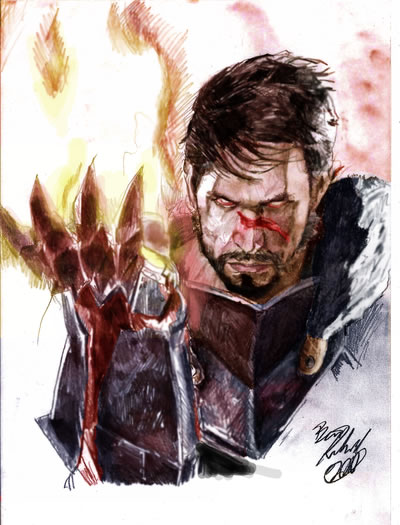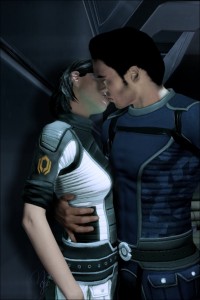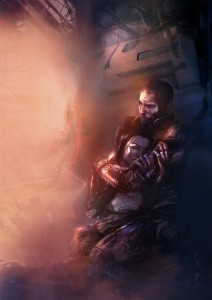By: Ashley Wrigley
![Dragon_Age_II_by_goku252525[1]](http://taboojive.com/wp-content/uploads/2011/04/Dragon_Age_II_by_goku2525251.jpg)
So in Origins, you assume the role of a Grey Warden and battle the Blight. In Dragon Age 2, you are the Champion… but of what? Go play and you’ll find out.
First report: the non-spoiler improvements to game mechanics. The player inventory is blissfully organized with a brand new blessed junk folder where loot is automatically stored for a quick and easy sell with a click of a button labeled “sell all junk”. Plus, armor, weapons, and accessories are easily dumped into the junk folder if you decide you want to sell them. So the hassle of trading had become suddenly painless. Also, crafting items no longer take up inventory space and the discovery of a crafting resource gives the player unlimited access to that resource; basically, as soon as you discover the recipe and crafting resources to make an item, you can make as much as you want as long as you have the coin to purchase it. Too easy? Perhaps, since in Origins one had to find all crafting components necessary for each product result, but I think it balances itself out since it technically didn’t cost money to craft in Origins as long as the player was dedicated in finding the supplies.
Speaking of armor and weapons, an interesting change is that the only companion customization the player can do is with weapons and accessories (rings, necklaces, and belts). Armor is strictly a player upgrade with the explanation of, “companions wear what they want.” At first, I found that annoying, but wound up liking it much better than nit-picking every single armor piece of everyone in my group. Plus, armor upgrades can be purchased from vendors or looted during quests, so my team remained on par with gear.
The skill tree was changed—an annoyance at first but likeable later. Combat improved, which was hard to imagine since it was already pretty cool in Origins, but something seemed more fluid this round. I played rogue both games, and I felt more useful in Dragon Age 2 than I did in Origins. Albeit something was easier this round and I can’t decide if the mobs were weaker or the characters just got stronger, but, aside from incredibly long cooldown timers on the only single-target heal and potions, there wasn’t much to hinder the encounters and I rarely had to reload a fight. Unlike nearly every encounter in Origins, strategy was only necessary in a handful of battles.
By the time Act III rolled around, I was able to enchant my gear with defense, armor, and +7 to all stats runes. My rogue’s critical chance and damage were already through the roof; so with +14 to all stats, and two defense and protection runes, I became so much harder to hit. I turned around and enchanted my team with defense and protection to help them soak up the damage better, and there wasn’t a single fight I faced in Act III that I came close to dying in. Even the major boss fights were so easy, it didn’t even really seem fair.
The only other thing that got in the way of combat—and game play in general—was BioWare’s problematic and limited graphic settings, which was tolerable in Origins but not so much this time around. Fog and particle spray is generally the biggest cause for lag, although Dragon Age 2 had a lot more areas that had lag issues, unlike Origins, which only had a couple of spots in the game where the frame rate was something like 2 fps (I exaggerate). Outside areas were sometimes rough, especially when facing the open water; a mountain graveyard covered in fog was barely navigable. My computer is pretty decent, but the particles were too much at times and the game’s graphics settings do not allow the player to adjust those finer details without dumbing down the entire visual experience. Minus ten points!
Speaking of graphics changes: what the heck was up with the elves? BioWare randomly decided to change the appearance of elves, which was extremely annoying and unnecessary.
And finally, a gigantic mechanical change is the replacement of the dialogue list with the dialogue wheel. It’s quick and easy and clearly defines the direction you’re moving in with symbols for each response—a drama mask for diplomatic responses, a strong arm for rivalry, a leaf for friendship, a heart for romance, and a question mark for simple and neutral queries. One of the cons, however, is that the character is not going to say what you’ve chosen them to say, just something similar. In some cases, your character says or does things you never wanted them to do. In Origins, the dialogue option chosen was the dialogue actually understood as being spoken (there was no player character voice acting in Origins). The wheel worked for the Mass Effect series, but I don’t think I’m a fan of it being used in the Dragon Age universe.
Moving on to potential spoilers, so if you haven’t played the game and don’t want it ruined, stop reading.
It’s interesting to note that the story is told in two unique ways. First, it’s told as a literal story. A woman belonging to the Chantry called the Seeker comes to Varric, later revealed as a teammate in the game, to be told the story of the Champion. All three acts are periodically interrupted by scenes between the Seeker and Varric as they banter over the tale. It’s really interesting and different and I enjoyed this particular convention of framing. The second is that it’s told over time. Each act faces a new plot that must be resolved with one overarching problem finally coming to head at end-game. The entire game takes place over seven years. Groovy, no?
The biggest and worst change is the relationships and how they are conducted. In Origins, you can talk to your team whenever you want; although it isn’t hard to get through their dialogue trees, it gives you as a player a feeling like you’re getting to know your team. In Dragon Age 2, you are only allowed to talk to your teammates in their personal home and it’s only about twice an act unless you’re doing their personal quest. At the end of Act I, I didn’t feel close to my teammates at all—I didn’t really care about them; so at the start of Act II (three years later), characters make comments to you about how long they’ve known you, how you’re such good friends, and it doesn’t feel real at all.
BioWare invents a lot here, imagining relationships the player has formed with his teammates that the player never gets to experience for himself/herself. Huge disappoint considering in Origins, I was very close to my team. Morrigan was like a sister to me, Sten was my best friend, I was head-over-heels in love with Alistair, and the list goes on and on; the last battle was very emotional as each teammate told me how much traveling together had meant to them. In Dragon Age 2, I didn’t really care about anyone very much, so during that last-moment-to-talk before the final battles, I was borderline “whatever” to my teammates’ over-affectionate goodbyes. Even my own character didn’t matter as much. I was very attached to my Warden in Origins and felt like her actions were my actions, but my Champion felt like a character I was playing, not me.
The dialogue wheel really screwed over teammate relationships as well. Since the relationship meter was changed from a scale of how the character felt about you (dislike, neutral, warm, love if pursued, etc) to friendship or rivalry, the wheel reflected those absolute choices. You can be friendly, diplomatic, or start a rivalry. It seemed too direct, whereas in Origins you just pick what you want to say and hope the person you’re talking to responds well—usually they do, but sometimes meaning well doesn’t cut it. It was too obvious to guide relationships this time. Plus, if you want to pursue a romance with a character, a special “heart” option appears, and you must pick all the heart options to activate the romance. I was like, “What? What is this?” And my character’s dialogue under the heart choices was so terrible it was near painful.
Not to mention the romances aren’t very fulfilling. I decided to romance the angsty mage Anders and the first flirt dialogue option I chose was reacted to with doom and destruction. Not very promising. The next moment of romance was delayed until Act II when I attempt to flirt with him again. More doom, gloom, and “I’m going to break your heart” speech sprinkled with a little bit of “you can’t tease me, I won’t be able to resist forever!” After his personal quest, I finally flirt Anders into the ground and he suddenly kisses me, declares he’ll come to me that night and, if I’m not there, he’ll know I heeded his warning to not be involved with him. Geez. But I show up anyway, and he rambles on about how “for three years, I’ve been lying in bed aching for you” and never once did I ever get to witness anything in his interactions that led me to believe that was true. Finally, the romance comes to a close in Act III when he chooses his mission over me and justifies it with the “I told you I’d break your heart” line. Lucky me decided to love him anyway, and the prologue says we run away together. The end.
How ridiculous and unfulfilling is that? All of the other romantic options were pretty extreme, too. There’s the mage-hating emo slave-turned-fighter, the promiscuous and licentious pirate, and the timid yet borderline psychotic bloodmage. Fantastic. Though each character had redeemable qualities as party mates, romancing any option didn’t seem overly rewarding.
Finally, the last point of contention was that no matter what choices you make in the game, the end is pretty much the same. Side with the mages or support the templars, very little actually changes. One person describes his experience like this: “No matter what I did, it didn’t seem to matter.” The end of the game changes the world dramatically, and the appearance of a familiar face—Leliana from Origins—links the Warden and Champion in some unexplained way. Dragon Age 3? Maybe so.
I suppose I’ve complained a lot. The game is a very good game, and it is definitely worth playing. However, coming off of the Origins high, Dragon Age 2 falls short. As a game? Great! As a successor of Origins? Lacking! Make sense? I know BioWare is the god of my gaming universe—and I give them kudos for shaking things up a bit—but hopefully the third game will find its way back to its roots.
Artwork by goku252525
Dragon Age: Warden vs. Champion,



Gamer
10 Apr 2011Mass Effect will always be better than Dragon Age, but hopefully BioWare stopped pandering to the EA core crowd (the shoot’em’up bang bang and then play some football games people). Mass Effect was supposed to be an RPG with third person shooter elements; how did it become a third person shooter with RPG elements? If I wanted to play that, then I would just wait for Relic’s Warhammer 40,000: Space Marine later this year! BioWare, BRING BACK THE RPGS!
Trouble
10 Apr 2011Well, it’s not like I don’t agree with some of your points, but I don’t think Mass Effect and Dragon Age need comparing. Both are great games in different fields. Sci-fi shooter… and fantasy RPG. You’re comparing apples and tomatoes; both are red, but otherwise completely different. Both games are great and did wonderful things for their genre! Anyhoo…
Why the sudden explosion about ME? This be about DA, homie.
This be about DA, homie.
Gamer
10 Apr 2011Oh yeah, I got a little side tracked after reading your other articles. No doubt DA is a kick-ass game too! I still just want the RPGS!!!